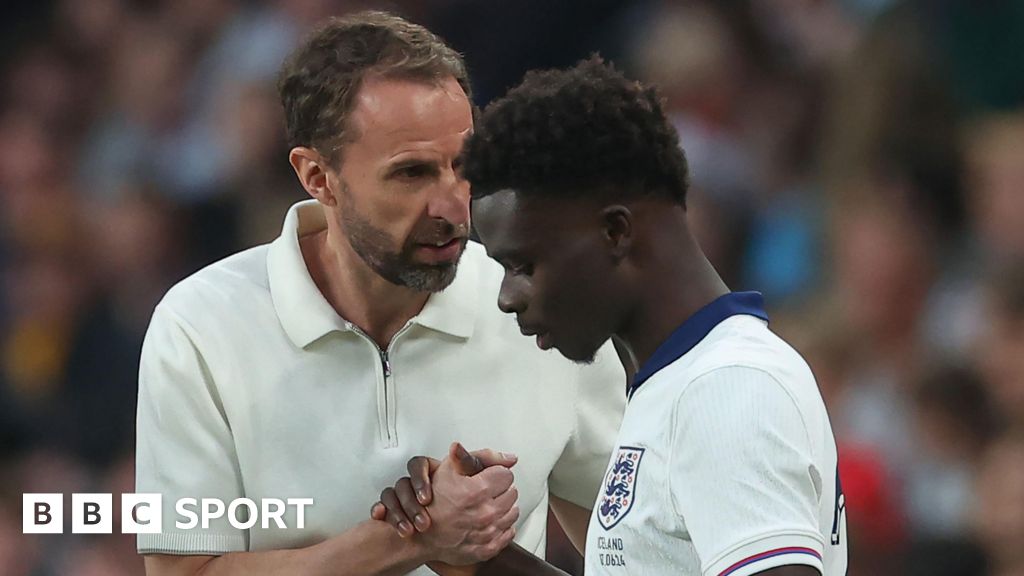Some media outlets have been criticised for the “divisive” choice of using a photograph of Bukayo Saka to illustrate England’s defeat by Iceland.
Saka came on as a 65th-minute substitute in the game at Wembley on Friday, but an image of him was used across several back pages of English newspapers.
A social media post of the coverage was highlighted by former England striker Ian Wright who said that “those deciding who goes on the back pages know what they’re doing”.
The Star and the Sun were highlighted for using a Saka image on their back pages, while the Telegraph used 22-year-old Saka to illustrate a player ratings post on X.
The BBC Sport website’s live text, which changes its main picture throughout the match, also used an image of Saka during the game after he had come on.
A BBC spokesperson said it “was not intended to highlight his performance specifically” and was one of a number of player images used.
“It is of course important that we are considerate and take care around the images we use,” they added.
In an open letter to editors, Kick It Out chief executive Tony Burnett said the media needs to “remember its responsibilities”.
Burnett said: “Over the last few years, we know that a lot of work has gone into diversifying the media industry, and it has helped in showing that perpetrators of discrimination have been brought to justice.
“But many fans will have woken up on Saturday morning and questioned whether anything has changed at all.
“Heading into Euro 2024, fans are rightly asking whether the current England squad will see a repeat of what happened to Saka, Marcus Rashford and Jadon Sancho after the last Euros final where all three suffered terrible online abuse because of their actions on the field.
“It’s a question we have been asking ourselves at Kick it Out.
“There has been progress with prosecutions, and the Online Safety Bill has been passed to hopefully bring more scrutiny on social media companies. But last season, we received more reports – both online and in stadiums – targeting players than ever before. So whatever gains we are making, they are not enough.
“I shouldn’t need to remind you that the impact of black players being targeted in the media has a long history and is felt far and wide. It sends a message that they are not welcome, that they are only a misplaced kick from being vilified and it sends a message to online abusers that targeting players is fair game.
“But it also sends a message to fans from black and ethnic minority communities that they do not belong or can be abused too. Those points need to be considered when writing headlines or selecting images as deadlines approach. The words and pictures travel a long way, hitting harder than you might realise.”
Delroy Corinaldi, executive director of Black Footballers Partnership, called the use of Saka imagery “divisive” and added: “We’ve been here before: the UK media has not learnt from its past behaviours.
“In 2018, Raheem Sterling called out the media for unfairly targeting young black footballers with negative headlines. Yet here we are a week before the Euro 2024 tournament, and the press are playing their age old games.”
Saka, Rashford and Sancho were racially abused on social media in the wake of all three missing penalties in England’s 3-2 shootout loss to Italy in the Euro 2020 final.
A day after suffering alleged racist abuse from Chelsea fans during his then-club Manchester City’s defeat at Stamford Bridge in December 2018, Sterling – who has since joined the Blues – said newspapers were helping to “fuel racism” by the ways in which they portray young black footballers.
Arsenal winger Saka made his England debut in October 2020 and has since accumulated 33 caps, scoring 11 goals.
Wright called for greater media responsibility, saying: “Now more than ever let’s get behind and support these young people. We can all see what’s happening and who’s being set up to be the face of defeat.
“Let’s keep our energy focused on giving these players pure love and support throughout the tournament.”
Football journalist Darren Lewis, who is assistant editor of the Daily Mirror and president of the Sports Journalists’ Association, also criticised the use of Saka’s image in the wake of the defeat.
“Just because I work in the media it doesn’t mean I can’t acknowledge the concern about Bukayo Saka being used as the face of England’s defeat and poor performance – despite other players performing worse – across a number of platforms,” Lewis wrote on social media.
“It is a reminder that we need to think about everything put into the public domain.”
BBC Sport has approached the Sun, the Star, the Telegraph, press regulator Independent Press Standards Organisation (Ipso) and newspaper body News Media Association for a response.

